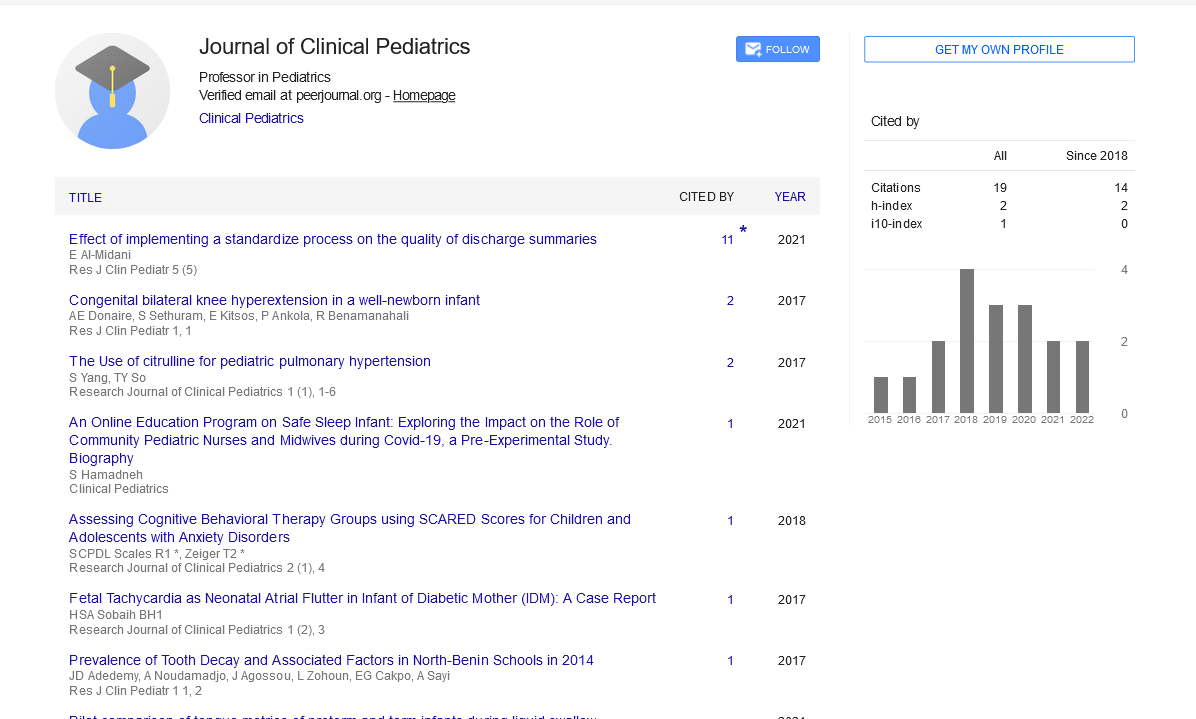Commentary, Res J Clin Pediatr Vol: 7 Issue: 1
General Pediatrics: A Comprehensive Overview
William lewis*
1Department of Pediatrics, University of Melbourne, Parkville VIC 3010, Melbourne, Australia
*Corresponding Author: William lewis
Department of Pediatrics, University of
Melbourne, Parkville VIC 3010, Melbourne, Australia
E-mail: william.lewis@uni.au
Received date: 16 February, 2023, Manuscript No. RJCP-23-96073;
Editor assigned date: 20 February, 2023, PreQC No. RJCP-23-96073 (PQ);
Reviewed date: 10 March, 2023, QC No. RJCP-23-96073;
Revised date: 17 April, 2022, Manuscript No. RJCP-23-96073 (R);
Published date: 24 April, 2023, DOI: 10.4172/Rjcp.1000136
Citation: Lewis W (2023) General Pediatrics: A Comprehensive Overview. Res J Clin Pediatr 7:1.
Description
Pediatrics is a specialized branch of medicine that focuses on the medical care of infants, children, and adolescents up to the age of 18. General pediatrics is a broad field that encompasses various aspects of child health, including growth and development, illness prevention, and treatment of childhood diseases. This manuscript provides a comprehensive overview of general pediatrics, including the role of pediatricians, common childhood conditions, and preventative health measures.
Causes of general pediatrics
Some of the most common causes of general pediatrics include:
Infectious diseases: Infectious diseases are a major cause of morbidity and mortality in children. Children are particularly susceptible to these diseases due to their underdeveloped immune systems. Some common infectious diseases in children include measles, chickenpox, pertussis, and meningitis.
Respiratory diseases: Respiratory diseases such as asthma, bronchitis, and pneumonia are common in children. Asthma is a chronic disease that causes inflammation in the airways, leading to wheezing, coughing, and shortness of breath. Bronchitis and pneumonia are acute respiratory infections that can be caused by viruses, bacteria, or other microorganisms.
Gastrointestinal disorders: Gastrointestinal disorders such as gastroenteritis, inflammatory bowel disease, and celiac disease can cause significant morbidity in children. Gastroenteritis is a common infection that causes diarrhea and vomiting. Inflammatory bowel disease and celiac disease are chronic conditions that affect the digestive system.
Allergic disorders: Allergic disorders such as eczema, allergic rhinitis, and food allergies are common in children. Eczema is a chronic skin condition that causes itching and redness. Allergic rhinitis is an allergic reaction to airborne allergens such as pollen and dust. Food allergies can cause severe reactions such as anaphylaxis.
Developmental disorders: Developmental disorders such as autism spectrum disorder and Attention-Deficit Hyperactivity Disorder (ADHD) are common in children. These disorders can affect a child's behavior, learning, and socialization skills.
Role of pediatricians
Pediatricians are medical doctors who specialize in the care of children. They are responsible for the health and wellbeing of their patients from infancy through adolescence. Pediatricians perform routine health check-ups, diagnose and treat illnesses and injuries, and provide preventative care, including immunizations. They also provide guidance to parents and caregivers on topics such as nutrition, development, and safety.
Common childhood conditions
There are numerous conditions that can affect children, some of which are more common than others. Common childhood conditions include asthma, allergies, ear infections, and gastrointestinal problems. Pediatricians are trained to identify and treat these conditions effectively. In addition, pediatricians are trained to recognize and manage developmental delays, behavioral disorders, and mental health issues that can affect children.
Preventative health measures
Preventative health measures are essential in maintaining a child's health and wellbeing. These measures include regular check-ups, immunizations, and screenings. Regular check-ups allow pediatricians to monitor a child's growth and development and identify any potential health concerns early on. Immunizations are an important preventative measure that protects children from infectious diseases such as measles, mumps, and rubella. Screenings, such as vision and hearing tests, can also identify potential health concerns before they become more serious.
Conclusion
General pediatrics is a crucial field that plays a vital role in the health and wellbeing of children. Pediatricians are responsible for diagnosing and treating a variety of childhood conditions, providing preventative care, and guiding parents and caregivers on issues related to child health. Preventative measures such as regular check-ups, immunizations, and screenings are important in maintaining a child's health and wellbeing. Parents and caregivers should work closely with pediatricians to ensure that their children receive the best possible care.
 Spanish
Spanish  Chinese
Chinese  Russian
Russian  German
German  French
French  Japanese
Japanese  Portuguese
Portuguese  Hindi
Hindi 
